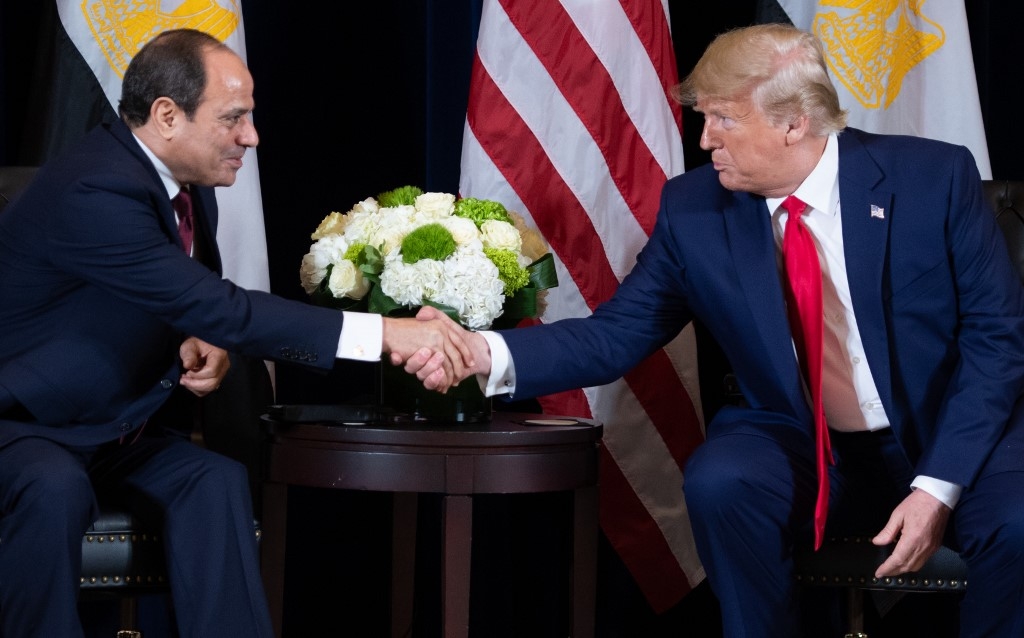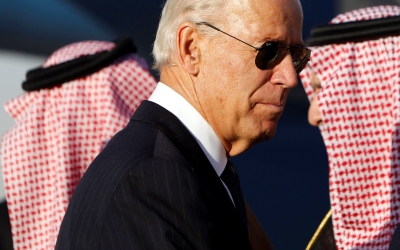US foreign policy has always relied on favourite dictators

Joe Biden's victory in the US election is said to "spell trouble" for outgoing US President Donald Trump's "favourite dictator," Egypt's Abdel Fattah el-Sisi. "The Egyptian president was quick to congratulate Biden, though the president-elect's rhetoric on human rights and political prisoners spells conflict," ran one news report.
Precisely for that reason, Generalissimo Sisi has expedited his crackdown on human rights advocates before Trump leaves office, exposing his "favourite" dictator to the liberal embarrassments of the next US president's song and dance about "human rights".
Such graphic epithets are coming back to haunt Americans, with their own tinpot tyrant refusing to step down from his throne
The curious phrase "my favourite dictator" has both an immediate and a distant history. In August 2019, while waiting to meet Sisi during the G7 summit in Biarritz, France, Trump reportedly quipped, in a voice loud enough that both Americans and Egyptians in his vicinity could hear: "Where's my favourite dictator?"
But the phrase also has deeper roots in US foreign policy parlance, as it is a thinly veiled euphemism for a much older and more colourful phrase attributed to former president Franklin D Roosevelt in reference to Nicaraguan dictator Anastasio Somoza: "Somoza may be a son of a bitch, but he's our son of a bitch."
Trump's reference to Sisi as "my favourite dictator" echoes Roosevelt's reference to Somoza as "our son of a bitch". There is some debate over who actually said "our son of a bitch" and about whom, but it is better to think of the phrase as a political legend - a floating signifier. What is constant in most of its variations is the US sentiment about a dime-a-dozen dictator somewhere in Asia, Africa or Latin America.
That such graphic epithets are coming back to haunt Americans, with their own tinpot tyrant refusing to step down from his throne, will not have any serious effect on the centrality of such "sons of bitches" in US foreign policy in the years to come. As Bruce Fein wrote in the Washington Post in 2017, "The soundtrack of our foreign policy for a century has been: 'He may be a son of a bitch, but he's our son of a bitch.'"
'Dancing with dictators'
In 2002, between the US invasions of Afghanistan and Iraq, the Washington Post's renowned Zionist warmonger, the late Charles Krauthammer, scolded the New York Times for having denounced "America's dancing with dictators". Krauthammer had no problem with that: "Guilty as charged. Dance we do. And without apology. With no more apology than Franklin Roosevelt offered when he reportedly said of Nicaragua's Anastasio Somoza, 'He may be a son of a bitch. But he's our son of a bitch.'
"Roosevelt was a grownup. He made choices. He slew his dragons one at a time. He understood that we do not live in the best of all possible worlds. He understood that in an international arena populated by sons of bitches, you make your distinctions, or you die."
Well, Krauthammer is dead now, but the wisdom of his insights into US foreign policy remains true to form.
There is no "misunderestimating" - as George W Bush, another prime example of the species, would say - the profound significance these sons of bitches have had on US foreign policy. I would propose that they are, in fact, the very foundations of US foreign policy. You deny it this ample supply of sons of bitches around the world, including a platoon in the Arab and Muslim world, and Americans would have to rely on their own sons of bitches and stop exploiting other people's resources.
A massive reservoir
Arabs and Muslims need our own sons of bitches for our own purposes. We must find courage and inspiration from former Iranian prime minister Mohammad Mosaddegh's nationalisation of Iranian oil, or former Egyptian president Gamal Abdel Nasser's nationalisation of the Suez Canal, and nationalise our own sons of bitches.
To be fair, US political scientists and philosophers have started in earnest to look for their own sons of bitches. In a major philosophical treatise aptly titled Assholes: A Theory, University of California Irvine professor Aaron James zoned in on the crucial category of American sons of bitches through their assholes.
American philosopher Harry Frankfurt, a professor emeritus at Princeton University, previously wrote another major study, On Bullshit, offering a detailed analysis of the prose and politics of these American sons of bitches. Later, Mark Manson, another major critical figure in this field, published the bestsellers Everything is Fucked: A Book About Hope and The Subtle Art of Not Giving a Fuck: A Counterintuitive Approach to Living a Good Life, the successes of which showed clearly that people around the world are in desperate need of learning how to deal with the sons of bitches in their own countries.
Transnational union
We as Arabs, Iranians and Muslims must also brand our own sons of bitches, for there are profound and crucial differences between Egyptian, Iranian, Saudi, Syrian, Emirati or Bahraini sons of bitches. Some are good at chopping up their critics inside embassies; others are better at slaughtering their own people; still others excel at sending Afghan refugees to Syria to fight the Islamic State sons of bitches.
Some are experts in leading a junta of sons of bitches in staging a military coup and stealing a people's revolution; still others are self-loathing Orientals rushing to normalise the historic theft of Palestine. These are all varieties on the theme of what Americans call their "sons of bitches".
Specific examples, such as the 1953 Iranian coup, or later the coups in Guatemala and Chile, show active collaboration between American, British and local sons of bitches
It is also plausible that there could be a transnational union of such sons of bitches. Specific examples, such as the 1953 Iranian coup, or later the coups in Guatemala and Chile, show active collaboration between American, British and local sons of bitches.
We ultimately need an international alliance of all these sons of bitches to come up with a working definition of who exactly is a son of a bitch - for there is a whole range of candidates sporting different qualifications. As the good book says: "Many are called, but few are chosen."
The views expressed in this article belong to the author and do not necessarily reflect the editorial policy of Middle East Eye.
Middle East Eye propose une couverture et une analyse indépendantes et incomparables du Moyen-Orient, de l’Afrique du Nord et d’autres régions du monde. Pour en savoir plus sur la reprise de ce contenu et les frais qui s’appliquent, veuillez remplir ce formulaire [en anglais]. Pour en savoir plus sur MEE, cliquez ici [en anglais].







